Part Analysis
| General Data | |
| Manufacturer (OEM) | CWT |
| PCB Type | Double-Sided |
| Primary Side | |
| Transient Filter | 6x Y caps, 2x X caps, 2x CM chokes, 1x MOV |
| Inrush Protection | 1x NTC Thermistor SCK-037 (3 Ohm @25°C) & Relay |
| Bridge Rectifier(s) |
1x GBJ1506 (600V, 15A @ 100°C)
|
| APFC MOSFETs |
2x Infineon IPA60R190P6 (650V, 12.7A @ 100°C, Rds(on): 0.190Ohm) &
1x Sync Power SPN5003 FET (for reduced no-load consumption) |
| APFC Boost Diode |
1x Onsemi FFSP0865A (650V, 8A @ 155°C)
|
| Bulk Cap(s) | |
| Main Switchers |
2x Infineon IPA60R190P6 (650V, 12.7A @ 100°C, Rds(on): 0.190Ohm)
|
| APFC Controller |
Champion CM6500UNX
|
| Resonant Controller |
Champion CU6901VACNH
|
| Topology |
Primary side: APFC, Half-Bridge & LLC converter
Secondary side: Synchronous Rectification & DC-DC converters |
| Secondary Side | |
| +12V MOSFETs | 4x Toshiba TPHR8504PL (40V, 150A @ 25°C, Rds(on): 0.85mOhm) |
| 5V & 3.3V | DC-DC Converters: 4x UBIQ QN3107M6N (30V, 70A @ 100°C, Rds(on): 2.6mOhm) PWM Controller(s): UPI-Semi uP3861P |
| Filtering Capacitors | Electrolytic: 4x Nichicon (3-6,000 @ 105°C, HD(M)), 3x Rubycon (6-10,000 @ 105°C, ZLH) 1x Rubycon (2-10,000 @ 105°C,YXF) 2x Nippon Chemi-Con (105°C, W) Polymer: 31x FPCAP, 2x Nippon Chemi-Con |
| Fan Controller | Microchip PIC16F1503 |
| Fan Model | Corsair NR140HP (140mm, 12V, 0.33A, Fluid Dynamic Bearing Fan) |
| 5VSB Circuit | |
| High Side Rectifier |
1x SMC RS1M (1000V, 1A @ 100°C)
|
| Standby PWM Controller | On-Bright OB2365T |
Channel Well Technology provides the platform, the same OEM that manufactured the previous generation of RMx units. CWT also makes the RMx Shift units. The RMx platform is different from the RMx Shift one, which is expected given the different placement of the modular board. The new RMx platform looks overloaded with parts, although the PCB’s dimensions are normal, and several daughter boards are used to save some space. Given the PSU’s efficiency, the heatsinks are large enough to take some burden off the fan’s shoulders for reduced noise output. The electrolytic caps on the secondary side are not blocked from the fan’s airflow and are of high quality. Although polymer caps are preferred for ripple filtering because of their increased tolerance to high operating temperatures and their high ripple current ratings, still, their increased cost and reduced capacitance make the electrolytic caps a requirement for every PSU. To cope with increased transient loads, besides a high-speed response, you also need increased capacitance on the secondary side, and that is where the electrolytic caps are required since they offer a high price per capacitance ratio.
The build quality is high, with good parts everywhere and excellent soldering quality on the PCB. The design follows the modern trend, with an APFC converter, half-bridge topology, and an LLC resonant converter on the primary side. On the secondary side is a synchronous rectification scheme for the 12V rail and a pair of DC-DC converters for the minor rails. The PSU also uses a Microchip MCU to control the fan’s speed.
The fan is the usual aspect: the Corsair NR140HP uses a fluid dynamic bearing that won’t bother you at low speeds.
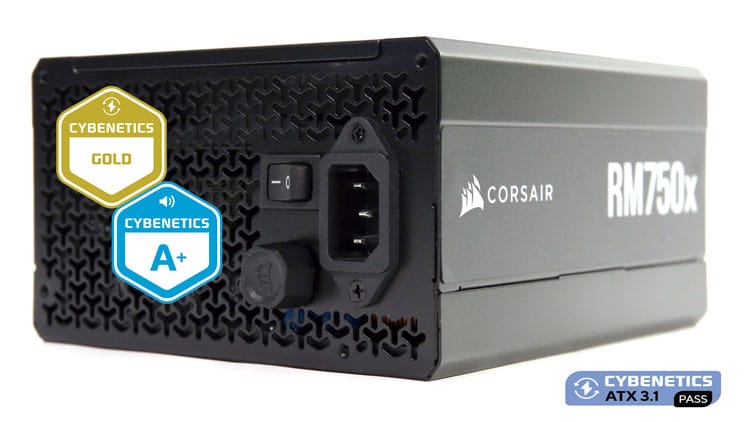
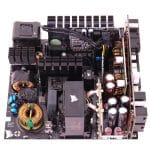
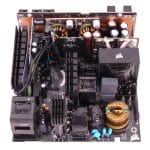
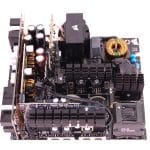
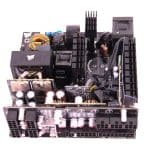
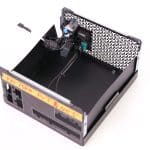
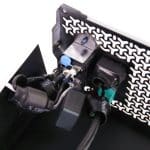
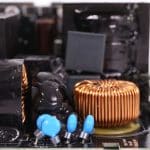
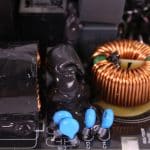
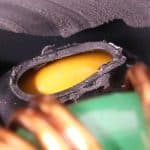
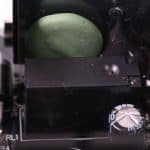
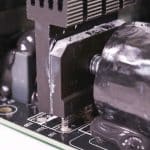
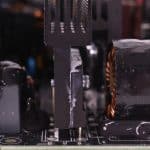
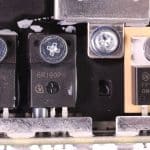
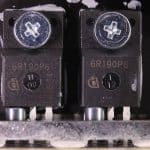
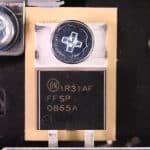
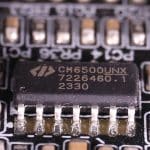
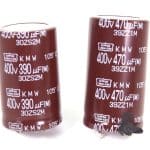
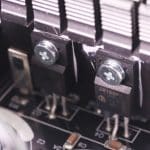
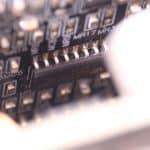
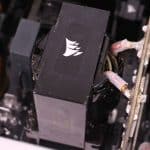
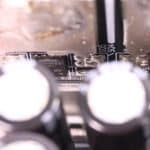
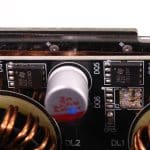
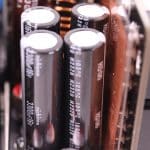
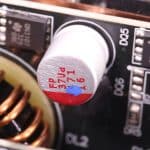
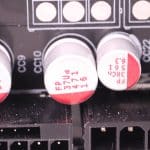
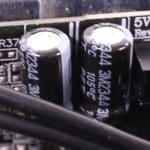
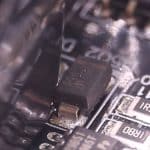
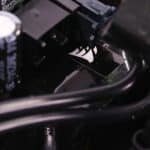
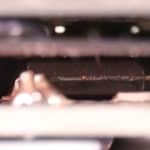
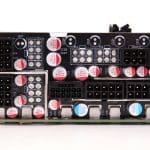
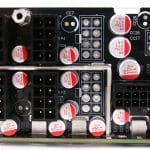
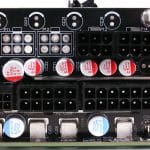
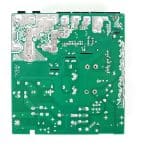
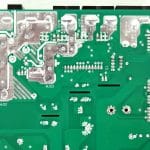
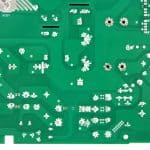
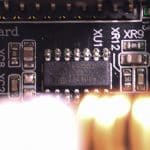
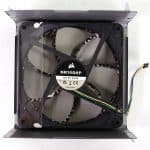
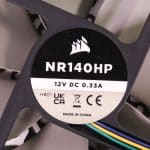


Hello Aris! Thanks for the great review, I’m considering buying this PSU and I would love if you could answer some of my questions:
I am a little confused, does this PSU have a 12+2 PCIe connector or a 12+4?
Also, which PSU do you recommend between this one and a MSI MPG A850G PCIe 5.0?
And finally, in the cybenetics website, the results are a little different from the ones here, for example the noise graph and the supplementary tests, could you explain to me why that is?
Thanks a lot again!
Hi, 12+2 or 12+4 are practically the same, since 2 of the sense connectors are not used by any PSU/GPU combo.
I would go for the Corsair
Cybenetics checks multiple samples per model, not just one.
Hey, thank you so much for replying!! Alright, got it, I will go for the Corsair, cheers!
I have been using MSI MAG A650GL PSU for the past year, there are no problems in video rendering, and in DAW usage. But when playing games which needs high GPU usage like Black Myth: wukong, when there is a power flactuation my PC restarts not always but occasionally. I’m using the 3060TI GPU, and its fine in normal games. Does this have to do anything with my psu holdup time, will this psu likely save me?
I forgot to mention I am using a 1.2kva UPS. Thank you
Hi, I just bought this psu unfortunetly I’m getting 11.8v on 12v rail by motherboard sensor and pcie gpu sensor and it lowers when in load, gpu only draw 30 watt from pcie so this is unexpected 8pin connector from gpu sensor stays around 11.9volt, is this a expected behaviour? My 10 years old bronze psu could give 12v consistently on motherboard sensor + pcie gpu sensor but 8 pin sensor was sacking to 11.7 on load. Should I return this psu I tryed my old gpu too its sensors also report low pcie voltage.
Do not trust what the mainboard’s sensors report, because they are entirely out of space (inaccurate) in most mainboards. Even a 5$ multimeter is way more accurate.
Thanks for the reply. What confuses me is how the graphics card can get normal voltage from the 8-pin connector, while the PCIe voltage from the 24-pin connector might be lower. After all, it’s the same 12V rail, right so sensor is likely the cultprit? I returned it because it was making a high-frequency sound. That’s why I didn’t try checking with a multimeter, but even if the sensors aren’t calibrated, the PCIe voltage dropping from 11.8V to 11.5V under only 30w load still raises doubts about this particular unit for me.
I am quite disappointed with the V12 of this power supply. Processor at 95w, graphics at 110w, and V12 at 11,712. What will happen when I insert a 250w graphics card? My previous 550w superflower never read below 12.
Hi Aris,
I really enjoy your content, though I rarely buy a PSU and try to keep it that way. I’m assembling a system that will consume 475w at peak CPU and GPU load (though that will only happen during a synthetic benchmark). For headroom and future-proofing, I’m planning to buy a 750w PSU. What would you recommend between an XPG Core Reactor II, Thermaltake GF3, and Corsair RMx? Is the Corsair the best choice for an Nvidia GPU given the included 12v-2×6 cable? I’m given to understand that the 6+2 to 12v-2×6 adapters are, when installed correctly, potentially better than a single 12vhpwr cable. It also seems that the Corsair is most reliable, based on consumer reviews. The XPG and Thermaltake are both 33% cheaper than the Corsair, so you could convince me to save the money but only if you felt the others could be equally reliable.
Hi! I would go for the RM750x (ATX v3.1). In general, the RMx line is one of the best out there. TT, I don’t trust it so much because I cannot know from whom it is made anymore. The XPG is pretty good, but I still prefer the Corsair unit.
Thank you!
Hi Aris,
I got this PSU after comparing many of the models you reviewed, manly for it’s low noise output and overall good performance. However my unit has extremely loud coil whine. I got it replaced under warranty, but the new one has the same issue. I assume this is happening because the PSU is almost exclusively operating in Burst Mode, since my system is drawing very little power (Zen 5 CPU, no GPU). Installing a GPU might resolve this, but that’s not something I can do right now. What would you suggest to resolve this issue? Get a lower rated Unit? A different model? Thanks for all these great reviews and work over at Cybenetics!
hm coil whine is a huge issue and also has to do with the rest system components. A lower rating PSU might help yes, but still it is mostly a trial-and-error procedure.
Tanks for taking the time to reply! I will give the new RM650e a shot, since it also performed well and has low noise output. It’s a shame since I got a great deal for the RM750x at 99,99€ on Black Friday, but it is what it is.
Hello, how did it go with the new power supply? Did everything work properly?
I just order this, but i cant get the Seasonic out of my head, is it worth another 20 usd over this one? Im very casual gamer and will be going in a 13600+4070 combo hopefully
Nice review, i buy this PSU(130 euro) and is amazing.
Hi, on page 8 “protections” it says 1046w for the OPP, but how is that 123% of 750w ? It would be 123% for a 850W unit, but for a 750W unit 1046W is 139.5%. If the OPP is set at 123%, then shouldn’t that be 922.5W ?
yeah the 850W unit’s table was there. Fixed now, thanks!
Thank you for the detailed review and your time spent for testing the units.
I just bought this unit on Amazon during BlackFriday deal because of good result in your test.
Aris did PCCooler YS1200 basically same PCB parts & design of Seasonic GX/PX-1200 ?
U mean the “Same Platform” thing?
Don’t remember sorry. please check Cybenetics if there is parts description for both units there.
Thank you for all these PSUs reviews !
you are welcome!